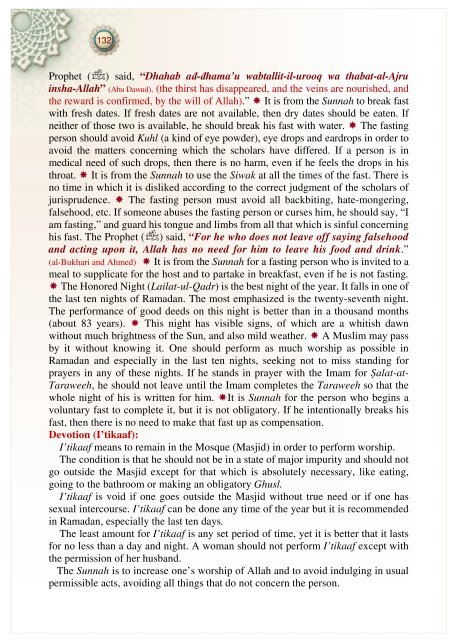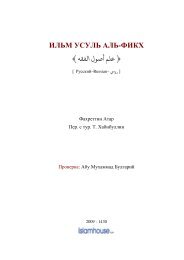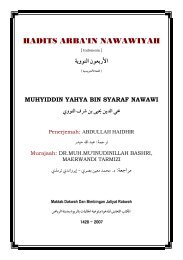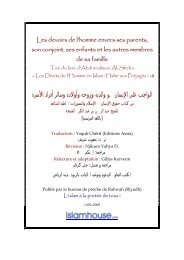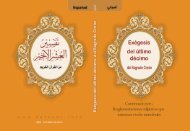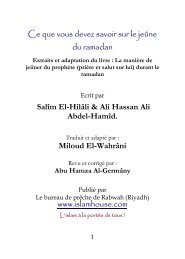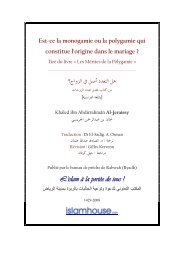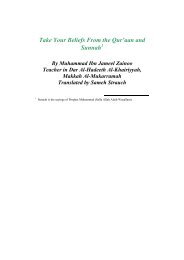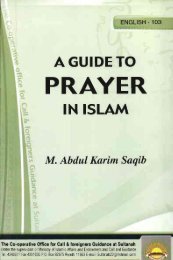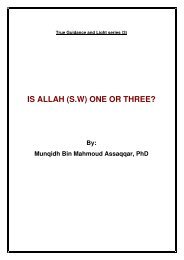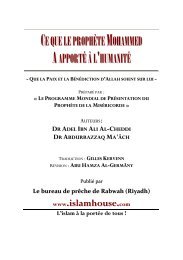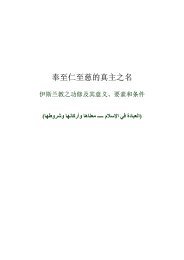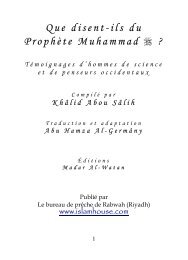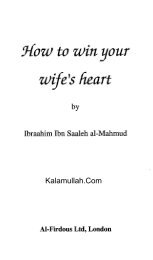are there? - Islam Center
are there? - Islam Center
are there? - Islam Center
Create successful ePaper yourself
Turn your PDF publications into a flip-book with our unique Google optimized e-Paper software.
132<br />
Prophet () said, “Dhahab a-hama’u wabtallit-il-urooq wa thabat-al-Ajru<br />
insha-Allah” (Abu Dawud) (the thirst has disappe<strong>are</strong>d, and the veins <strong>are</strong> nourished, and<br />
the reward is confirmed, by the will of Allah).” It is from the Sunnah to break fast<br />
with fresh dates. If fresh dates <strong>are</strong> not available, then dry dates should be eaten. If<br />
neither of those two is available, he should break his fast with water. The fasting<br />
person should avoid Kuhl (a kind of eye powder), eye drops and eardrops in order to<br />
avoid the matters concerning which the scholars have differed. If a person is in<br />
medical need of such drops, then <strong>there</strong> is no harm, even if he feels the drops in his<br />
throat. It is from the Sunnah to use the Siwak at all the times of the fast. There is<br />
no time in which it is disliked according to the correct judgment of the scholars of<br />
jurisprudence. The fasting person must avoid all backbiting, hate-mongering,<br />
falsehood, etc. If someone abuses the fasting person or curses him, he should say, “I<br />
am fasting,” and guard his tongue and limbs from all that which is sinful concerning<br />
his fast. The Prophet () said, “For he who does not leave off saying falsehood<br />
and acting upon it, Allah has no need for him to leave his food and drink.”<br />
(alBukhari and Ahmed) It is from the Sunnah for a fasting person who is invited to a<br />
meal to supplicate for the host and to partake in breakfast, even if he is not fasting.<br />
The Honored Night (Lailat-ul-Qadr) is the best night of the year. It falls in one of<br />
the last ten nights of Ramadan. The most emphasized is the twenty-seventh night.<br />
The performance of good deeds on this night is better than in a thousand months<br />
(about 83 years). This night has visible signs, of which <strong>are</strong> a whitish dawn<br />
without much brightness of the Sun, and also mild weather. A Muslim may pass<br />
by it without knowing it. One should perform as much worship as possible in<br />
Ramadan and especially in the last ten nights, seeking not to miss standing for<br />
prayers in any of these nights. If he stands in prayer with the Imam for Salat-at-<br />
Taraweeh, he should not leave until the Imam completes the Taraweeh so that the<br />
whole night of his is written for him. It is Sunnah for the person who begins a<br />
voluntary fast to complete it, but it is not obligatory. If he intentionally breaks his<br />
fast, then <strong>there</strong> is no need to make that fast up as compensation.<br />
Devotion (I’tikaaf):<br />
I’tikaaf means to remain in the Mosque (Masjid) in order to perform worship.<br />
The condition is that he should not be in a state of major impurity and should not<br />
go outside the Masjid except for that which is absolutely necessary, like eating,<br />
going to the bathroom or making an obligatory Ghusl.<br />
I’tikaaf is void if one goes outside the Masjid without true need or if one has<br />
sexual intercourse. I’tikaaf can be done any time of the year but it is recommended<br />
in Ramadan, especially the last ten days.<br />
The least amount for I’tikaaf is any set period of time, yet it is better that it lasts<br />
for no less than a day and night. A woman should not perform I’tikaaf except with<br />
the permission of her husband.<br />
The Sunnah is to increase one’s worship of Allah and to avoid indulging in usual<br />
permissible acts, avoiding all things that do not concern the person.


